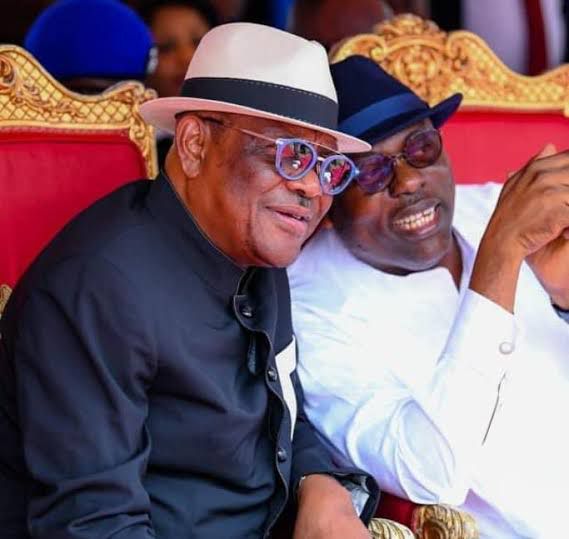By Chidipeters Okorie
Abuja, NIGERIA — Nigeria’s oil-rich Rivers State, Governor Siminalayi Fubara has finally made a move for reconciliation with his estranged political mentor and current Minister of the Federal Capital Territory, Nyesom Wike. In a closed-door meeting held at Wike’s private Abuja residence, the suspended governor reportedly went as far as kneeling before the minister—an image as symbolic as it is politically telling.
The meeting, confirmed by multiple political aides and sources familiar with the matter, was convened in a last-ditch effort to calm the escalating crisis that has brought governance in Rivers State to a near standstill.
Facilitated by heavyweight political figures including Governor Dapo Abiodun of Ogun State, Governor Francis Nwifuru of Ebonyi, and former Ogun State Governor Olusegun Osoba, the session marks the most direct attempt at reconciliation since Fubara and Wike’s highly publicized fallout last year.

“Governor Fubara walked straight into Wike’s living room—he knows the terrain well—and without hesitation, he went on his knees,” said a source privy to the encounter who spoke on condition of anonymity. “It was a powerful moment. Symbolism matters in Nigerian politics, and Fubara’s gesture was as clear an olive branch as anyone could offer.”
The feud between Fubara and Wike, once political allies, erupted shortly after Fubara was elected governor in 2023 with Wike’s full backing. But tensions quickly escalated into a public battle for control of the state’s political machinery. Wike, who had hoped to maintain significant influence in the state after his tenure, reportedly felt betrayed as Fubara began asserting his independence, purging loyalists and reshaping the state’s administrative priorities.
The political turbulence drew national attention and culminated in a drastic intervention by President Bola Tinubu, who in an unprecedented move, declared a state of emergency in Rivers State earlier this year. In doing so, Tinubu suspended Fubara, his deputy, and the state House of Assembly, appointing a Sole Administrator to govern the state temporarily. While the action was seen by some as a stabilizing force, critics labeled it an overreach and a dangerous precedent for executive interference in state matters.
Wike, for his part, had reportedly advocated for Fubara’s complete removal. “I wanted him gone,” Wike is said to have told close allies, according to multiple sources familiar with internal discussions. However, Tinubu’s decision to suspend—rather than sack—the governor is widely viewed as a political compromise aimed at preventing further unrest in the volatile Niger Delta region.
The stakes could not be higher. With militants in the Delta threatening to target oil infrastructure in protest of the federal intervention, and Rivers State’s economy teetering, a resolution to the crisis has become a matter of national urgency. Fubara’s recent meeting with Tinubu in London—followed swiftly by his trip to Abuja to meet Wike—signals a coordinated attempt to chart a path forward.
Whether the governor’s appeal to Wike yields a lasting peace remains uncertain. Analysts warn that personal reconciliations may not be enough to resolve deep institutional divides. “This is not just a political spat—it’s a battle for control of one of Nigeria’s most strategic states,” said Emeka Opara, a political analyst based in Port Harcourt. “Kneeling is a gesture. What’s needed is a concrete agreement on power-sharing, governance, and long-term stability.”
As of press time, neither Wike nor Fubara has issued a formal statement about the meeting. The Presidency has also remained silent, possibly to allow backchannel diplomacy to continue without public scrutiny.
Still, the image of a sitting governor kneeling before his former mentor is a powerful one—one that speaks volumes about the fragile nature of political loyalty in Nigeria, and the high cost of disobedience in a system where power is often more personal than institutional.
Whether this gesture marks the beginning of healing or the start of a new chapter in an ongoing political saga remains to be seen. But one thing is clear: the drama in Rivers is far from over.